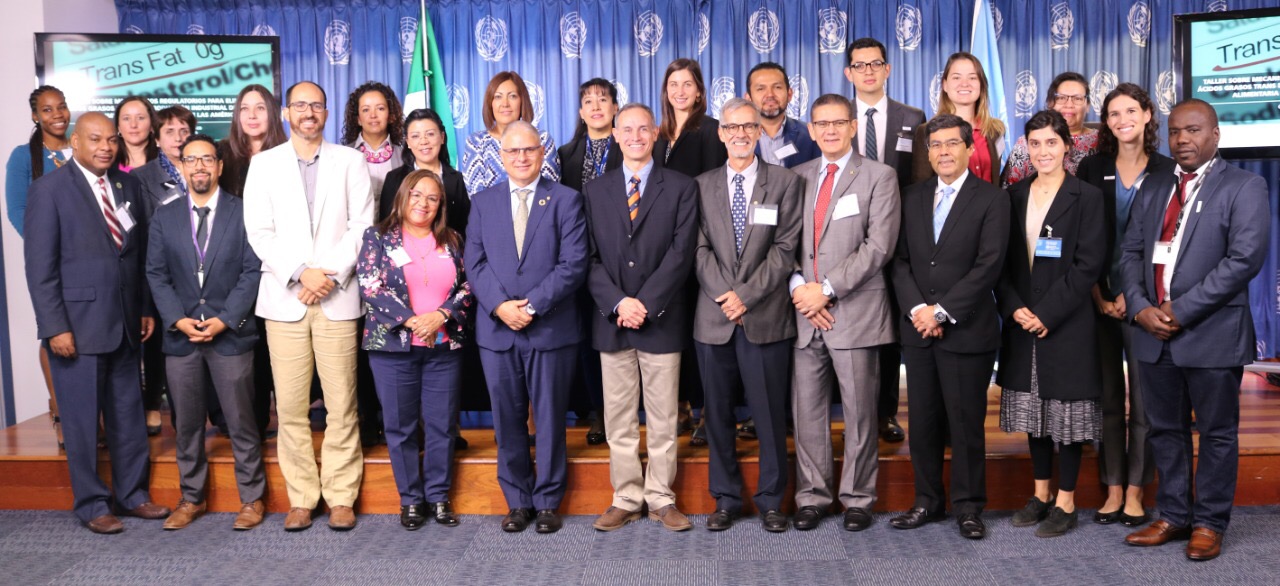Prepared by: Marlan Cole
Director – Government Analyst – Food and Drug Department (GA-FDD)
|
Activity/Event:Workshop on Regulatory Mechanisms to Eliminate Industrially Produced Trans Fatty Acids (IP-TFA) from Food Supply in the Region of the Americas Dates: 17-18, July 2019 Place:Office of the Pan-American Health Organization (PAHO)– Mexico City / Mexico
|
|
Objectives: 1. To present the range of existing regulatory mechanisms in the Region that aims to eliminate IP-TFA from the food supply.
2. To discuss the most Effective Regulatory channels and Policy options to tackle the issue.
3. To discuss a roadmap to establish Regulatory Mechanisms for the elimination of IP-TFA.
|
|
Justification Approximately 540,000 deaths are attributed to the consumption of Industrially Produced- Trans Fatty Acid (IP-TFA) globally and some 160,000 of those deaths occur in the Americas. The intake of a significant amount of trans-fat increases the risk of death from coronary heart disease by 28% and the prevalence of coronary heart disease by 21%. The industrial process of prolonging the shelf life of oil (hydrogenation) results in the production in partially hydrogenated vegetable oil (liquid to solid) e.g. Margarine. These are used in food processing as ingredients in baked products and / or for deep frying. IP-TFA consumption is also associated with long-term inflammation, insulin resistance and type II diabetes. Trans fats also increases the level of LDL- (low density lipid protein levels) and lowers the HDL- (high density lipid protein levels), which in time increases your risk of developing heart disease, stroke among and other chronic illnesses, especially in persons who are overweight or obese. According to the Pan-American Health Organization (PAHO) Report 2017 “Health in the Americas”, Ischemic Heart Disease/Cardiovascular Disease is the number one (1) cause of death in Guyana among person’s ages 45-80 years. IP-TFA may very well be the contributing factor here but no research is available currently. PAHO in 2007 established a Task Force and also issued the Rio de Janeiro Declaration in 2008 to eliminate IP-TFA from the food supply chain on a voluntary basis. Minimal success was achieved in this regards, since IT-TFA are currently being used in approximately 27 Member States including Guyana. In 2018 therefore, The World Health Organization (WHO) Launched the “REPLACE” action to support governments who are keen on eliminating IP-TFA from their food supply chain. The “L” in the REPLACE acronym is to “Legislate or enact regulatory actions to eliminate IP-TFA” and this among other strategies is calling for regulatory and/or enforcement bodies in member states to take action. Hence the presence for the GA-FDD of Guyana being represented at this very important meeting.
|
|
Summary of Workshop– 2 Days Mexico Meeting Day 1– Welcome and Opening remarks were given by PAHO- Mexico Office representative Mr. Cristian Morales Fuhrimann and Dr. Hugo Lopez-Gatell Sub-Secretary of Health Promotion and Prevention of Mexico. The meeting’s structure, objectives, expectations, methodology and Agenda were presented by Mr. Fabio Da Silva Gomes, PAHO’s Nutritional and Physical Activity Advisor. Ms. Linsday Steele represented from the Organization- Resolve to Save Lives (RTSL) presented policy options and regulatory pathways to eliminate IP-TFA to participants, followed by the Global Health Advocacy Incubator (GHAI) representative Ms. Kyra Berasi who presented the WHO “REPLACE” action model. Representatives from Colombia and Peru made presentations on World Trade Organization (WTO) considerations that were taken into account and principles used to design their Regulatory action / steps to eliminate IP-TFA from Peru and Colombia’s food supply chain. Peru and Colombia, presented also their experiences in enacting Regulations to eliminate IP-TFA. Representatives from the Caribbean that were present at this meeting were from Guyana, Jamaica and the CARICOM Regional Organization for Standard and Quality (CROSQ). Individual countries were then tasked with designing a roadmap of policy (regulatory action) against IP-TFA and determine possible barriers and this exercise was after presented to participants interactively. Day-2 Mr. Fabio Gomes of PAHO presented details of IP-TFA chemistry and its associated public health risk to consumers. Ms. Steele from RTSL Org. demonstrated to participants, mechanisms that can be used to implement, monitor and enforce regulatory action against IP-TFA and Ms.Berasi from GHAI,suggested ways and means to implement monitor and enforce the “REPLACE” action. The second (2nd) of two fishbowl activity was conducted with Colombia and Peru on implementation, while the first (1st) focused on legislative action enactment against IP-TFA. Finally individual countries made presentation on how they would implement, monitor, and enforce regulatory actions to eliminate IP-TFA from the food chain. Again this was a very useful interactive session. The workshop then concluded and suggestions were made for follow up action in the interest of public health.
|
|
Recommendations/Follow-up: The “REPLACE” Model should be pursued by the Ministry of Public Health to eliminate IP-TFA from our food chain and should be adopted as part of the Presidential Advisory Committee on NCD’s strategy. The GA-FDD will make a compilation / list with quantities where possible on the importation and locally manufactured products or ingredients that are derived from IP-TFA. The GA-FDD will urgently develop laboratory capabilities / capacity to detect Trans Fat levels / % in foods. The GA-FDD will make representation to the Hon Minister of Public Health to urgently make changes to the 1977 Food and Drug Regulations, to ban Partially Hydrogenated Oils (PHO) and restrict IP-TFA to 2 % or 5 % in foods. The GA-FDD will work closely with the Attorney General Chambers Office to ensure requested/ suggested changes to the Regulations by the Hon Minister of Public Health are in compliance with the Laws of Guyana and are without prejudice. The GA-FDD will try to also fast tract Frontal Label packaging requirements and include restriction for salt and sugar’s use in foods by making changes to our current label Regulations. The GA-FDD will also ask CROSQ to urgently adopt or pursue a restricting standard for IP-TFA in food used in the CARICOM committee.
|






